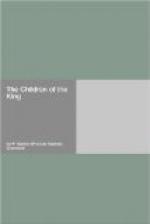“Eat,” he said laconically.
They both jumped up and thanked him, and pulled at their ragged caps before they took the bread and cheese from his hand. He nodded gravely, which was his way of explaining that he could not hear but that it was all right, and then he watched them as they set to work.
“Like wolves,” he said solemnly, as he looked on.
The place was quite deserted at that hour. Only now and then a woman passed, with an earthen jar of water on her head and her little tin bucket and rope in her hand. The public well is not fifty yards from Antonino’s house, up the brook and on the left of it. The breeze was dying away and it was very hot, though the sun was already behind the high rocks of the cape.
“Where are the beasts?” asked Don Antonino, as the boys swallowed their last mouthful.
Ruggiero threw his head back and stuck out his chin, which signifies negation in the south. He knew it was of little use to speak unless he could get near the old man’s ear and shout.
“And what are you doing here?” asked the latter.
Speech was now unavoidable. Ruggiero stood on tiptoe and the old man bent over sideways, much as a heavily laden Dutch galliot heels to a stiff breeze.
“The mother is dead!” bawled the boy in his high strong voice.
Oddly enough the tears came into his eyes for the first time, as he shouted at the deaf old man, and at the same moment little Sebastiano’s lower lip trembled. Antonino shook his head in rough sympathy.
“We have also beaten Don Pietro Casale, and so we have run away,” yelled the boy.
Antonino grunted thoughtfully and his grey eyes twinkled as he slowly righted himself and stood up again. Very deliberately he went into the shop again and presently came back with a big measure of weak wine and water.
“Drink,” he said, holding out the jug.
Again the two boys pulled at their caps and each raised the jug respectfully toward the old man before drinking.
“To health,” each said, and Antonino nodded gravely.
Then Ruggiero took the jug inside and rinsed it, as he knew it was his duty to do and set it on the table. When he came back he stood beside his brother, waiting for Don Antonino to speak. A long silence followed.
“Sleep,” said the old man. “Afterwards we will talk.”
He took his old place in the doorway and stared steadily out to sea. The boys lay down beside the house and having eaten and drunk their fill and walked a matter of fifteen miles, were sound asleep in three minutes.
At sunset Ruggiero sat up suddenly and rubbed his eyes. Don Antonino was no longer at the door, and the sound of several men’s voices came from within, mingled with the occasional dull rattle of coarse glasses on wooden tables.
“O!” Ruggiero called softly to his brother. Then he added a syllable and called again, “O-e!” Little Sebastiano woke, sat up and looked about him, rubbing his eyes in his turn.




